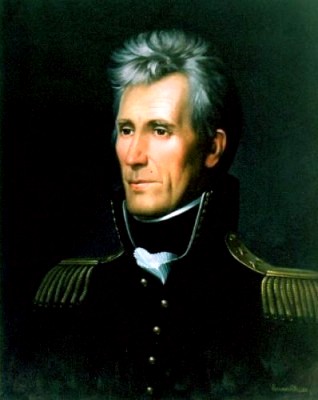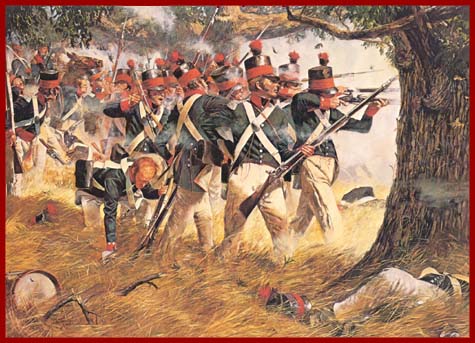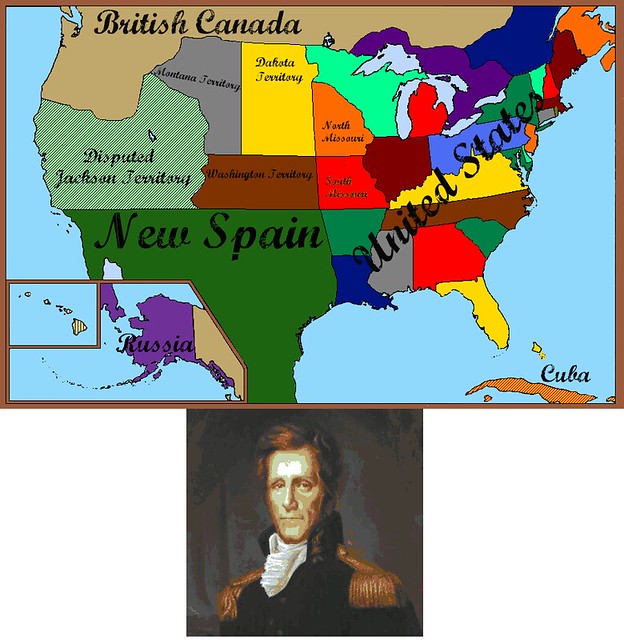PART III
Chaos:
The Presidency of C. C. Pinckney and the New Revolution
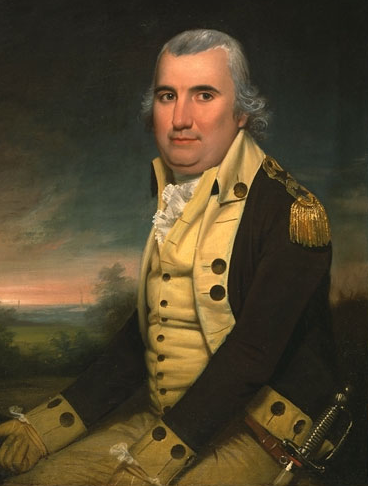
Chaos:
The Presidency of C. C. Pinckney and the New Revolution

By the time the election of 1792 rolled around, Adams was the most hated man in North America. Michael Ellsworth, one of his most trusted advisers, defected to Britain, which did not help anything. Congress elected Pinckney in a landslide, with only two votes for Adams. Jefferson received 10. Pinckney received all the rest.
Hamilton, the new vice president, immediately advised President Pinckney to repeal some of Adams' more controversial laws. Within two months, half of Adam's "accomplishments" were dust in the wind. Adams went to live a quiet life on Virginia's frontier... inside a fortified complex with armed guards to keep him safe from disgruntled Republicans.
Pinckney continued the military buildup, almost buckling the treasury. Many suspected that the government was planning to invade Canada once again, where pro-American, pro-French sentiment had been building, especially in Quebec. Those suspicions were confirmed when 12,000 troops marched north early in 1793. Britain responded by strengthening its garrisons and shipping over more men from Europe. Most of the American generals along the border were old veterans of the Revolution. However, among the ranks of infantry was an ambitious 26 year-old major named Andrew Jackson.
Jackson, only a youth during the War for Independence, was known as a war hawk and for his hatred of the British. In 1779, a British officer slashed him on the hand and face with a saber for refusing to polish his boots. Except for his father, who had passed away earlier, his entire family died because of the war. Trying to get revenge, he enlisted in the army under Adams and worked his way up; he was a hero in the War of 1789 for having led the bombardment of Fort McEnroe, near Lake Michigan, and for killing 50 pro-British Iroquois almost single-handedly while leading it. Now, he was in charge of the 5th North Carolina Regiment of Foot, right at the Canadian border. Little did he know what fate had in store for him.
Due to America's small, but growing, trade fleet, more money began appearing in the treasury. New trade routes opened in Europe, especially with the various German countries. Even the poorest states now had an adequate amount of trade, and many were actually rich. Still, discontent with tyrannical Federalists led much of the public to secretly wish for a second Revolution.
Pennsylvania and Virginia were the wealthiest states, for obvious reasons. The two states also did not see eye-to-eye on many matters, from slavery to the amount of government control. South Carolina, despite having one of their own as president, remained unhappy. Several more times, it threatened secession. Rhode Island continued to blissfully run their micronation in peace, sometimes openly hostile to the US.
Despite all this, the upper class remained thrilled about the government, however intrusive it seemed to the lower classes.
For two years, the American public would have a period of peace and economic bounty. That would change.
Thomas Jefferson still called out for liberty, along with Thomas Paine and other influential Democratic-Republicans. The Federalists had become the nation's bourgeois. The generals promoted after the Revolution were almost always promoted because of their political leanings. Some said Jackson would have been a general already if it had not been for the fact that he was an Anti-Federalist. Henry Knox continued to oppose the Federalists, something which would benefit him later.
Anti-government sentiment finally came to a head on September 28th, 1794. While Pinckney was making a speech in Richmond, Virginia, a local farmer hurled curse words and then pulled out a pistol. One of Pinckney's "Bicorn Bullies," his security troopers, tackled the would-be-assassin before he could aim clearly. While the shot went off, it hit a nearby tree and did no harm whatsoever. The security troopers beat the man into unconsciousness. Minutes later, the farmer died.
The crowd who had come to listen to Pinckney became outraged. A riot broke out, yelling that the man had not been treated lawfully. A local militia surrounded Pinckney as he attempted to flee. The disaster that followed became known as the Flight from Richmond. As he boarded his coach, a berserk man with a pitchfork lunged at him, and was immediately shot by a soldier. The crowd screamed in anger and rushed the militiamen. They succeeded in grabbing the man who fired the shot, and before the others could do anything about it, they had hanged him on a dead tree. The militia formed a square in an attempt to break up the riot. Someone shouted to fire.
Two dozen peasants fell dead from gunshots. As the militia beat the others into submission, the Presidential Coach took off as quickly as possible.
It was not over. The crowd dispersed into the city, there to find arms and swords. A huge ad-hoc militia ran out in the streets to meet the soldiers and engaged them in a short gun battle which left fifteen dead on both sides. The government troopers ran for their lives and fled north to an army post, where they linked up with professional soldiers.
In Richmond, the tipping point had come. An old, retired French officer took temporary charge of the rebels. He scaled the nearby town hall and ripped the flag down, hoisting a "Don't Tread on Me" instead. Waving his sword, he shouted "Vive la nouvelle révolution!"
It was on. As soon as the news reached the different states that Richmond was in rebellion, they either sided with or against the government. Virginia and South Carolina were the first to announce that the government needed to be overthrown. North Carolina immediately followed suit. Then came Georgia, Maryland, New Jersey, and Delaware. New England, Pennsylvania, and New York panicked and called for conscripts. Within a month, rebel soldiers were engaging Federal forces in Maryland and Northern Virginia. Within two months, Rhode Island was sending in troops to assist in bringing down Pinckney and the Federalists. Vermont's Federalist state government, already unstable, was overthrown in a coup by soldiers of the Revolutionary Green Mountain Boys. Setting up the Green Mountain Republic, they attacked the Federalists from behind. Soon, the lower classes of the New England states were also revolting. The entire country seemed like it was collapsing.
In December, 1793, a mob rushed into the military headquarters in Philadelphia and threw out the garrison. Terrified, Pinckney, Hamilton, and their friends and family fled west, in an attempt to reach the Northwest Territory.
Henry Knox and Anthony Wayne rushed out toward the mob with a detachment of cavalry and made their true allegiance clear. Cheering and tearing down the flag at the President's Castle, they swore allegiance to the rebels. Upon learning of the flight of Pinckney and Hamilton, they rode to catch up. Pinckney was apprehended the next day, but Hamilton had slipped out of their grasp. Pinckney was cuffed and thrown in a jail cell in Pittsburgh.
The New Revolution was almost complete. Forces still loyal to the Federalists gathered in Massachusetts and planned to launch a last, all-out assault to the southwest in attempt to regain Pennsylvania.
In Philadelphia, the enlightened Tom Paine became one of the leaders of the interim government, but Henry Knox let it be known that he was in charge of the army. He tried to keep order, but some of the more unruly elements started hanging Federalists. It was not until Jefferson arrived that order was established. He condemned the executions and violence, saying that Pinckney should be released and a solution reached. This hurt him politically, and made him decide not to run for president again.
Henry Knox and Tom Paine took control of the new government, but were in over their heads. As the South was coming close to deciding to leave the Union permanently and the Federalists were mounting their final attack, they turned to one man. The newly promoted General Andrew Jackson.
Jackson mobilized all rebel forces, which included most of the old Canadian border troops, and rushed southeast to flank the marching Federalist army. On February 10th, the first Jacksonian artillery shell was heard whizzing over the Federalist forces. The Battle of Stamford had begun.
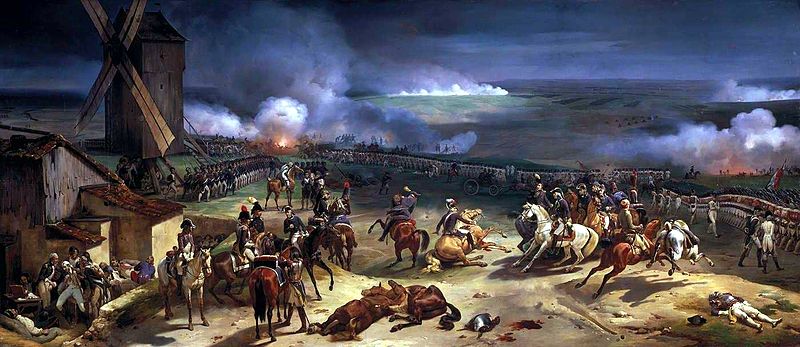
Centered around a farmstead, the Jackson-led artillery barraged the Federalist infantry. The New Englanders tried to do a flanking maneuver to the east, but cavalry forces under the command of Jackson himself routed them. The Federalists brought up all the cannon they had and dueled with the rebels. For over ten hours the cannonade continued, resulting in the valiant Federalist artillery making a last stand. All government guns were captured or destroyed. The New Revolution was effectively over.
Historians disagree as to how "Jackson's Star" rose so quickly and how he won over an entire nation. Some said it was his personality and military experience, while others said he was just a man in the right place at the right time. The Second American Republic was a volatile pact between the states and there needed to be someone who could keep them together. Some said Jackson had planned out his moves for power carefully while others said he took it one step at a time. Either way, he was to become one of history's leading figures.
Two weeks after the Battle of Stamford, Jackson made his triumphal entrance into Philadelphia. Thousands thronged around him and applauded his every move. He became the first celebrity soldier since Washington. He spoke with a Southern accent, was good with the ladies, and now "wore more medals than King George," as one of his privates joked. It might have been a joke, but it was a glimpse of things to come.
The New Revolution was not just felt in US territory. It actually triggered an uprising in Spanish Louisiana and Florida. The French-speaking residents of Louisiana hated being under Spanish rule. The southernmost section declared its independence as the Republic of Orleans on February 3rd, 1793. It was not long before Alexander Hamilton popped up. On February 20th, Hamilton offered his experience to the Orleans government. For the next two years, he helped establish the new government while the ragtag army did battle with Spanish forces. Trying to avoid replicating their British rivals, the Spanish eventually gave in. For a hefty sum, much of which was personally paid by Hamilton, they sold the Orleans rebels the entire region of Louisiana. It was uncivilized, but it was huge. They also eventually gave up Florida, where Jackson had secretly sent his friends to convince them to apply for statehood.
The American citizens' enthusiasm for the new Second Republic was dying. It was too chaotic. Rhode Island still had not made up its mind. Vermont, or the Green Mountain Republic, was acting like an independent nation again, as it had before Adams brought it into the Union. Henry Knox's popularity could only do so much. The rising Aaron Burr looked promising, but was still doing just that, rising. Andrew Jackson was the only one who remained thoroughly popular.
After two years, the government of the United States of America was about to change one more time.
Hamilton, the new vice president, immediately advised President Pinckney to repeal some of Adams' more controversial laws. Within two months, half of Adam's "accomplishments" were dust in the wind. Adams went to live a quiet life on Virginia's frontier... inside a fortified complex with armed guards to keep him safe from disgruntled Republicans.
Pinckney continued the military buildup, almost buckling the treasury. Many suspected that the government was planning to invade Canada once again, where pro-American, pro-French sentiment had been building, especially in Quebec. Those suspicions were confirmed when 12,000 troops marched north early in 1793. Britain responded by strengthening its garrisons and shipping over more men from Europe. Most of the American generals along the border were old veterans of the Revolution. However, among the ranks of infantry was an ambitious 26 year-old major named Andrew Jackson.
Jackson, only a youth during the War for Independence, was known as a war hawk and for his hatred of the British. In 1779, a British officer slashed him on the hand and face with a saber for refusing to polish his boots. Except for his father, who had passed away earlier, his entire family died because of the war. Trying to get revenge, he enlisted in the army under Adams and worked his way up; he was a hero in the War of 1789 for having led the bombardment of Fort McEnroe, near Lake Michigan, and for killing 50 pro-British Iroquois almost single-handedly while leading it. Now, he was in charge of the 5th North Carolina Regiment of Foot, right at the Canadian border. Little did he know what fate had in store for him.
Due to America's small, but growing, trade fleet, more money began appearing in the treasury. New trade routes opened in Europe, especially with the various German countries. Even the poorest states now had an adequate amount of trade, and many were actually rich. Still, discontent with tyrannical Federalists led much of the public to secretly wish for a second Revolution.
Pennsylvania and Virginia were the wealthiest states, for obvious reasons. The two states also did not see eye-to-eye on many matters, from slavery to the amount of government control. South Carolina, despite having one of their own as president, remained unhappy. Several more times, it threatened secession. Rhode Island continued to blissfully run their micronation in peace, sometimes openly hostile to the US.
Despite all this, the upper class remained thrilled about the government, however intrusive it seemed to the lower classes.
For two years, the American public would have a period of peace and economic bounty. That would change.
Thomas Jefferson still called out for liberty, along with Thomas Paine and other influential Democratic-Republicans. The Federalists had become the nation's bourgeois. The generals promoted after the Revolution were almost always promoted because of their political leanings. Some said Jackson would have been a general already if it had not been for the fact that he was an Anti-Federalist. Henry Knox continued to oppose the Federalists, something which would benefit him later.
Anti-government sentiment finally came to a head on September 28th, 1794. While Pinckney was making a speech in Richmond, Virginia, a local farmer hurled curse words and then pulled out a pistol. One of Pinckney's "Bicorn Bullies," his security troopers, tackled the would-be-assassin before he could aim clearly. While the shot went off, it hit a nearby tree and did no harm whatsoever. The security troopers beat the man into unconsciousness. Minutes later, the farmer died.
The crowd who had come to listen to Pinckney became outraged. A riot broke out, yelling that the man had not been treated lawfully. A local militia surrounded Pinckney as he attempted to flee. The disaster that followed became known as the Flight from Richmond. As he boarded his coach, a berserk man with a pitchfork lunged at him, and was immediately shot by a soldier. The crowd screamed in anger and rushed the militiamen. They succeeded in grabbing the man who fired the shot, and before the others could do anything about it, they had hanged him on a dead tree. The militia formed a square in an attempt to break up the riot. Someone shouted to fire.
Two dozen peasants fell dead from gunshots. As the militia beat the others into submission, the Presidential Coach took off as quickly as possible.
It was not over. The crowd dispersed into the city, there to find arms and swords. A huge ad-hoc militia ran out in the streets to meet the soldiers and engaged them in a short gun battle which left fifteen dead on both sides. The government troopers ran for their lives and fled north to an army post, where they linked up with professional soldiers.
In Richmond, the tipping point had come. An old, retired French officer took temporary charge of the rebels. He scaled the nearby town hall and ripped the flag down, hoisting a "Don't Tread on Me" instead. Waving his sword, he shouted "Vive la nouvelle révolution!"
It was on. As soon as the news reached the different states that Richmond was in rebellion, they either sided with or against the government. Virginia and South Carolina were the first to announce that the government needed to be overthrown. North Carolina immediately followed suit. Then came Georgia, Maryland, New Jersey, and Delaware. New England, Pennsylvania, and New York panicked and called for conscripts. Within a month, rebel soldiers were engaging Federal forces in Maryland and Northern Virginia. Within two months, Rhode Island was sending in troops to assist in bringing down Pinckney and the Federalists. Vermont's Federalist state government, already unstable, was overthrown in a coup by soldiers of the Revolutionary Green Mountain Boys. Setting up the Green Mountain Republic, they attacked the Federalists from behind. Soon, the lower classes of the New England states were also revolting. The entire country seemed like it was collapsing.
In December, 1793, a mob rushed into the military headquarters in Philadelphia and threw out the garrison. Terrified, Pinckney, Hamilton, and their friends and family fled west, in an attempt to reach the Northwest Territory.
Henry Knox and Anthony Wayne rushed out toward the mob with a detachment of cavalry and made their true allegiance clear. Cheering and tearing down the flag at the President's Castle, they swore allegiance to the rebels. Upon learning of the flight of Pinckney and Hamilton, they rode to catch up. Pinckney was apprehended the next day, but Hamilton had slipped out of their grasp. Pinckney was cuffed and thrown in a jail cell in Pittsburgh.
The New Revolution was almost complete. Forces still loyal to the Federalists gathered in Massachusetts and planned to launch a last, all-out assault to the southwest in attempt to regain Pennsylvania.
In Philadelphia, the enlightened Tom Paine became one of the leaders of the interim government, but Henry Knox let it be known that he was in charge of the army. He tried to keep order, but some of the more unruly elements started hanging Federalists. It was not until Jefferson arrived that order was established. He condemned the executions and violence, saying that Pinckney should be released and a solution reached. This hurt him politically, and made him decide not to run for president again.
Henry Knox and Tom Paine took control of the new government, but were in over their heads. As the South was coming close to deciding to leave the Union permanently and the Federalists were mounting their final attack, they turned to one man. The newly promoted General Andrew Jackson.
Jackson mobilized all rebel forces, which included most of the old Canadian border troops, and rushed southeast to flank the marching Federalist army. On February 10th, the first Jacksonian artillery shell was heard whizzing over the Federalist forces. The Battle of Stamford had begun.

Centered around a farmstead, the Jackson-led artillery barraged the Federalist infantry. The New Englanders tried to do a flanking maneuver to the east, but cavalry forces under the command of Jackson himself routed them. The Federalists brought up all the cannon they had and dueled with the rebels. For over ten hours the cannonade continued, resulting in the valiant Federalist artillery making a last stand. All government guns were captured or destroyed. The New Revolution was effectively over.
PART IV
Radicals and Patriots:
The Second Republic and the Rise of Jackson

Radicals and Patriots:
The Second Republic and the Rise of Jackson

Historians disagree as to how "Jackson's Star" rose so quickly and how he won over an entire nation. Some said it was his personality and military experience, while others said he was just a man in the right place at the right time. The Second American Republic was a volatile pact between the states and there needed to be someone who could keep them together. Some said Jackson had planned out his moves for power carefully while others said he took it one step at a time. Either way, he was to become one of history's leading figures.
Two weeks after the Battle of Stamford, Jackson made his triumphal entrance into Philadelphia. Thousands thronged around him and applauded his every move. He became the first celebrity soldier since Washington. He spoke with a Southern accent, was good with the ladies, and now "wore more medals than King George," as one of his privates joked. It might have been a joke, but it was a glimpse of things to come.
The New Revolution was not just felt in US territory. It actually triggered an uprising in Spanish Louisiana and Florida. The French-speaking residents of Louisiana hated being under Spanish rule. The southernmost section declared its independence as the Republic of Orleans on February 3rd, 1793. It was not long before Alexander Hamilton popped up. On February 20th, Hamilton offered his experience to the Orleans government. For the next two years, he helped establish the new government while the ragtag army did battle with Spanish forces. Trying to avoid replicating their British rivals, the Spanish eventually gave in. For a hefty sum, much of which was personally paid by Hamilton, they sold the Orleans rebels the entire region of Louisiana. It was uncivilized, but it was huge. They also eventually gave up Florida, where Jackson had secretly sent his friends to convince them to apply for statehood.
The American citizens' enthusiasm for the new Second Republic was dying. It was too chaotic. Rhode Island still had not made up its mind. Vermont, or the Green Mountain Republic, was acting like an independent nation again, as it had before Adams brought it into the Union. Henry Knox's popularity could only do so much. The rising Aaron Burr looked promising, but was still doing just that, rising. Andrew Jackson was the only one who remained thoroughly popular.
After two years, the government of the United States of America was about to change one more time.
Last edited:
